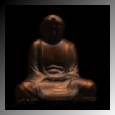
From Nagarjuna's Treatise on the Great Perfection of Wisdom
(Dharmamitra Translation)
By way of illustration, in The Buddha Speaks the Analogy of the Poisonous Snakes Sutra, there once was a man who had offended the King. The King ordered that he be required to carry around a basket and look after it. Inside the basket there were four poisonous snakes. The King ordered the criminal to look after them and raise them. This man thought to himself, "It's a difficult thing to have to draw close to four snakes. If one grows close to them they bring harm to a person. I could not raise even one of them, how much the less could I do that for four of them." And so he cast aside the basket and ran away.
The King ordered five men carrying knives to chase after him. There was yet another man who tried to persuade him to obey. [This other man] had it in mind to bring him harm and so said to him, "Just raise them in a sensible fashion. There will be no suffering in that."
But the man became wise to this and so ran off, fleeing for his life. When he came to an empty village there was a good man who assisted him by telling him, "Although this village is empty, it is a place that is frequented by thieves. If you now take up residence here you will certainly be harmed by the thieves. Be careful. Don't dwell here." At this point he took off again and next arrived at a great river. On the other side of the river there was a different country. That country was a peaceful, blissful and easeful place. It was a pure place devoid of any form of calamity or adversity. Then he gathered together a mass of reeds and branches and bound them into the form of a raft. He moved it along with his hands and feet. He exerted all of his strength in seeking to make a crossing. When he had reached the other shore he was at peace, happy and free of distress.
The King represents the demon king. The basket represents the human body. The four poisonous snakes represent the four great elements. The five knife-wielding thieves represent the five aggregates. The man of fine speech but evil mind represents defiled attachment. The empty village represents the six sense faculties. The thieves represent the six sense objects. The one man who took pity on him and instructed him represents the good [spiritual] teacher. The great river represents love. The raft represents the eightfold right path. The hands and feet earnestly applied to making a crossing represent vigor. This shore represents this world. The other shore represents nirvana. The man who crossed over represents the arhat who has put an end to outflows. This is just the same in the dharma of the bodhisattva.